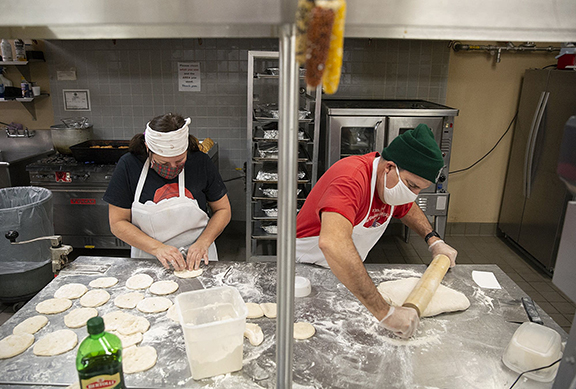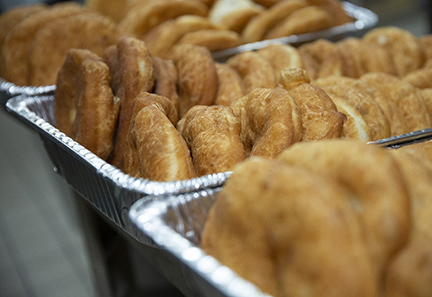
By Kathryn Styer Martinez/MPR News
It’s the first big snowstorm of winter. Bob Rice and Angel Swann are out running errands and picking up food in Rice’s minivan. Even though the weather reports advise against driving, Rice, an enrolled member of the White Earth Nation and a born-and-raised Minnesotan, says there are no snow days for him.
And besides, he has more than 400 people to feed during a life-changing pandemic.
Rice is the owner of Pow Wow Grounds coffee shop, situated between the American Indian Center and the Minnesota Chippewa Tribe building on Franklin Avenue in Minneapolis. Together with Dream of Wild Health, where Swann works, and the Minnesota Two-Spirit society, Rice and crew set out to cook and deliver holiday meals to community members in need. Rice stresses that this event is a collaboration of organizations, funders and volunteers – a real community effort.
For Thanksgiving, Rice and other volunteers and organizations came together to cook and deliver about 400 meals to people, and on Christmas Eve, another 429 meals went out the door. The effort was designed to help people save money on food in order to spend it on things like rent or medical bills, while also encouraging them to stay home because of the coronavirus.

Swann, a member of the White Earth Band of Ojibwe, notes that a lot of community members have diet-related health issues and makes the connection between what we eat and our overall health.
“When we are fueling our bodies with Indigenous foods, our bodies remember those tastes. They remember that they make us feel good. It’s a part of us,” said Swann. “It’s very healing, not only for your physical health to eat healthy food, but it’s also healing to your spirit.”
Swann and Dream of Wild Health helped source local, organic food options. All their produce came from the Good Acre farm in Falcon Heights.
The Dec. 24 meals consisted of traditional indigenous fare: buffalo prime rib, squash, roasted carrots and potatoes, wild rice and apple cobbler and wild rice balls for desert. Fry bread – not a traditional staple, but beloved nonetheless – was a last-minute addition to the menu.
The day before delivery, Linus Yellowhorse was busy cooking more than 250 meals at the American Indian Center and didn’t miss a beat transitioning from feeding elders in the morning to picking up supplies and prepping for the next day in the kitchen. Yellowhorse worked through the night cutting up three bushels of apples.
Yellowhorse works as a chef at the Gatherings Cafe in the American Indian Center. He cooks meals that are delivered to community elders so they can stay safe at home. The pandemic and food insecurity have disproportionately affected Indigenous communities, according to Second Harvest Heartland, the Twin Cities food bank.
Sometimes the hours in the kitchen are difficult, and after putting in a long day, Yellowhorse walked home in a blizzard. Originally from the Tohono O’odham Nation in southern Arizona, he moved to Minneapolis two years ago and has been cooking for his community ever since.

“I’m here not for me, I’m here for the elders,” he said.
Elders play an important role in Indigenous communities. They are storykeepers and teachers of tradition. When it comes to meal time, Rice says, “Elders always eat first.”
On Christmas Eve, when meals were packaged to be delivered, the first 100 meals – along with medicines and pharmaceuticals – went to the community elders.
The volunteer crew gathered around foldout tables assembling medicine bags. They filled the handmade cloth bags with traditional plant medicines: cedar, sage and sweetgrass for protection and red willow bark or tobacco as an offering to the ancestors. People together from southern and northern tribes chatted and laughed while music played.
In addition to the food, plant medicines and medical kits, the volunteers also shared another kind of medicine: laughter. It is scarce medicine these days, but on this day, it was a salve for the spirit and made sure that the holiday meals fed more souls than intended.
Minnesota Public Radio News can be heard on MPR’s statewide radio network or online.






